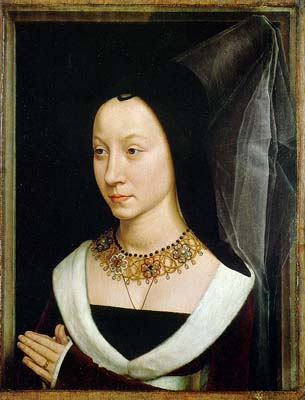|
Hans Memling’s portraits
A couple of weeks ago, because a friend was writing a book review on the subject, I discovered 15th century Netherlandish art, which for some reason had previously escaped my attention. I was immediately struck by some of the portraits by Hans Memling, in which there is shown a specific, particular, idiosyncratic individual, caught in a single instant of time, almost in the transition from one thought to the next, while there is also a sense of the transcendent framework of Christian truth in which this person is living.

For example, in the portrait of Maria Portinari, painted around 1470, we see the slight compression of the muscles around her mouth, expressing the subtlest movement of her thought, yet this highly individualized person is not living in relation merely to worldly things, but to God. It is a perfect expression of the Western Christian consciousness, reaching a peak in the Renaissance, in which the individual and God, the concrete and the transcendent, are in perfect balance with each other. The portrait is part of a devotional triptych in which Maria’s husband, Tommaso, is on the left. The painting hangs in the Metropolitan Museum of Art. (See also Memling’s portrait of Bernardo Bembo.) A reader writes:
Sometime ago I think I noted to you that going to the symphony is in some sense an act of defending Western civilization; patronizing the arts is a humane and civilized act, endorsing those things the jihad seeks to destroy. The Dutch and Flemish painters were geniuses. I recall walking out of the Rijksmuseum in Amsterdam one day some years ago after absorbing all that art, always with the “golden light,” and there on the canal bank was that same light! That same golden hue seen in paintings from 500 plus years earlier was hovering over the grass and trees. Yes, modern science would explain that light as a product of so much water vapor, so many particles per cubic meter, the sun at such an angle … but the effect was simply stunning, there was a sense of continuity to it, that the light so treasured by artists of centuries ago was right outside the museum door, right there over picnics and children. It was a moment I treasure, and this reproduction of a painting reminds me of it. It reminds me of what we stand to lose, and how to retain it.LA replies:
I thank the reader for this. I would only quibble on one passing point if I may. I don’t think that this should be seen as “taking pride” in Western civilization. How can we be “proud” of things we did not create? Rather, it is about loving the true and the good, which lifts us up, and makes us realize with gratitude and excitement that we ourselves are participants and heirs of the civilization and culture that created these things. And that makes us realize what we are and what is at stake.Stephen writes:
I like this remark a lot. I had a related thought recently regarding historical misdeeds of the West, decimation of the Indians, slavery, etc. White Americans and Westerners have become convinced that whatever their ancestors did “wrong” destroys the legitimacy of their civilization. It does not. (This is not claimed for any nonwestern people—except maybe the Japanese). What I feel we need is to love our ancestors as we love our parents, warts and all, and affirm our connection to them. We are fully free to debate whether the atom bombings were right or wrong, but we should see anyone who uses Western misdeeds to fan up hatred for the West as the enemy they are.LA repies: I agree.Howard Sutherland writes:
About your observation that we should not “take pride” in Western civilization as its achievements are not ours personally, what about an appreciation of our inheritance; enough to appreciate that we have a duty to preserve it and pass it on? Also, if we believe it (Christianity) is true, we should say so. Defending the West means challenging Islam in religious terms.LA replies:
I agree with most of what Mr. Sutherland says. My criticism of “pride” is not just of the idea that we are taking personal credit for something we did not create; however, I’m unable at the moment to say what I do mean. It will come to me eventually. Posted by Lawrence Auster at March 15, 2006 11:55 PM | Send Email entry |